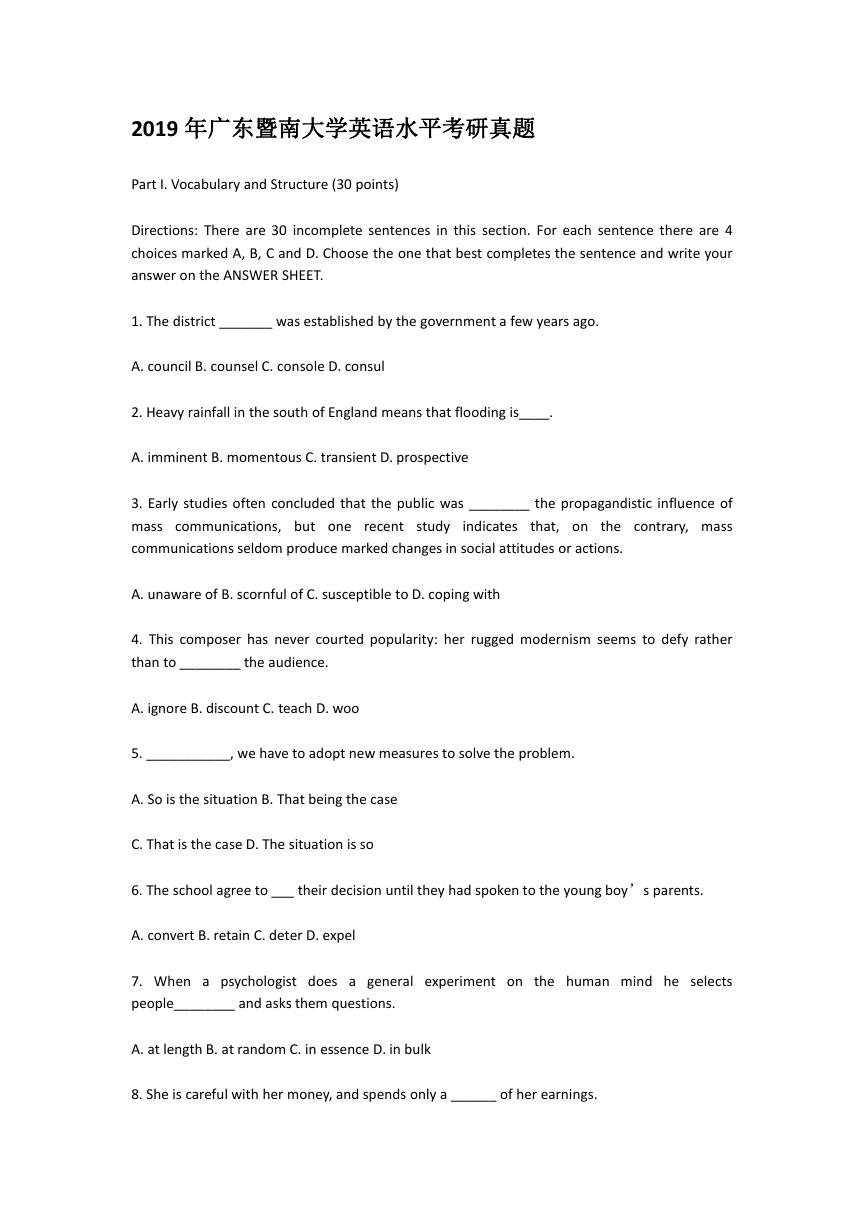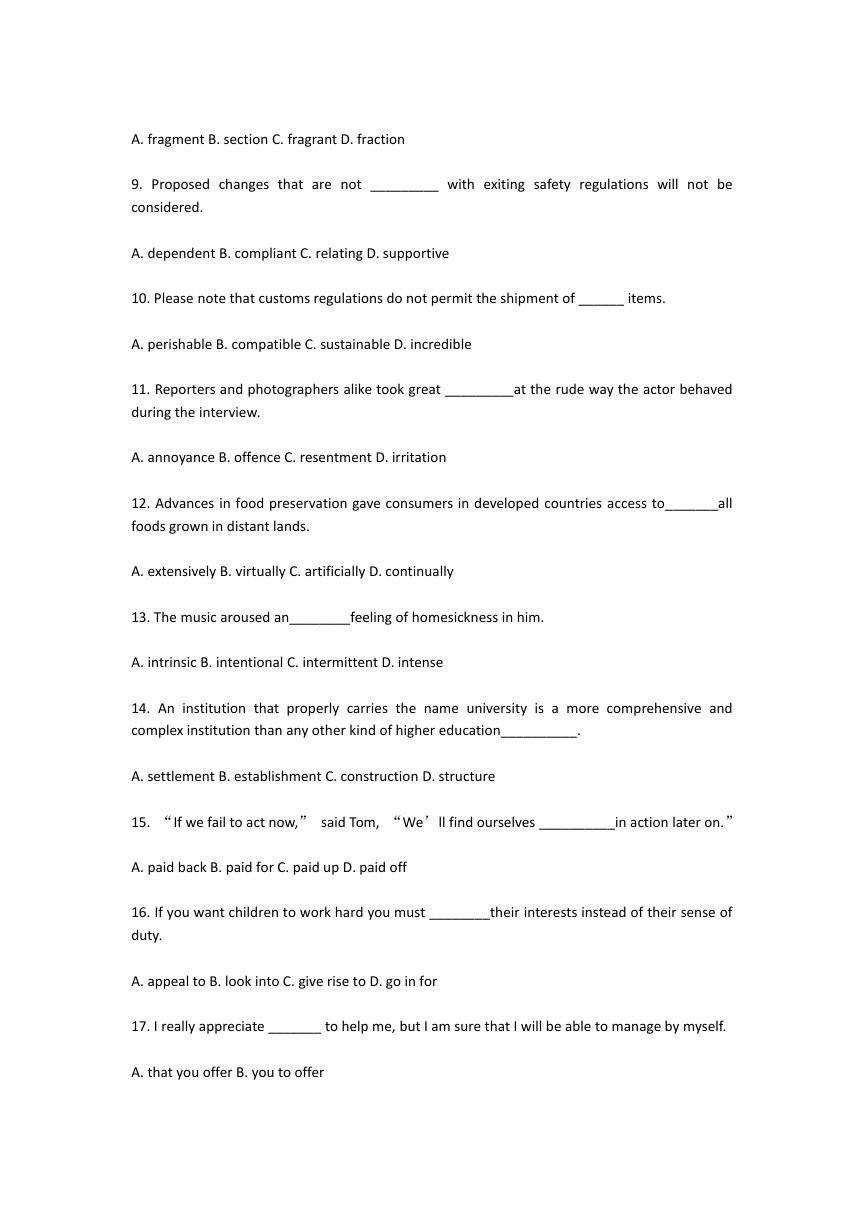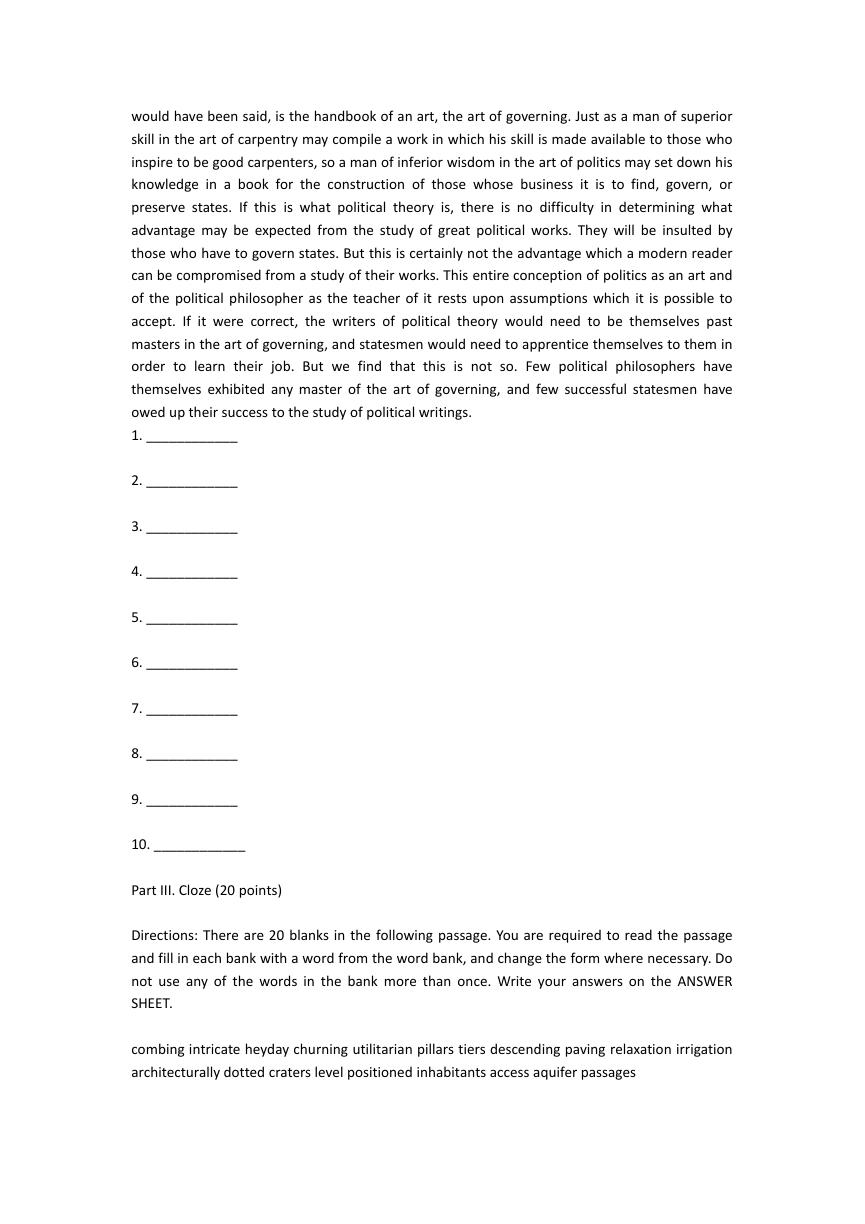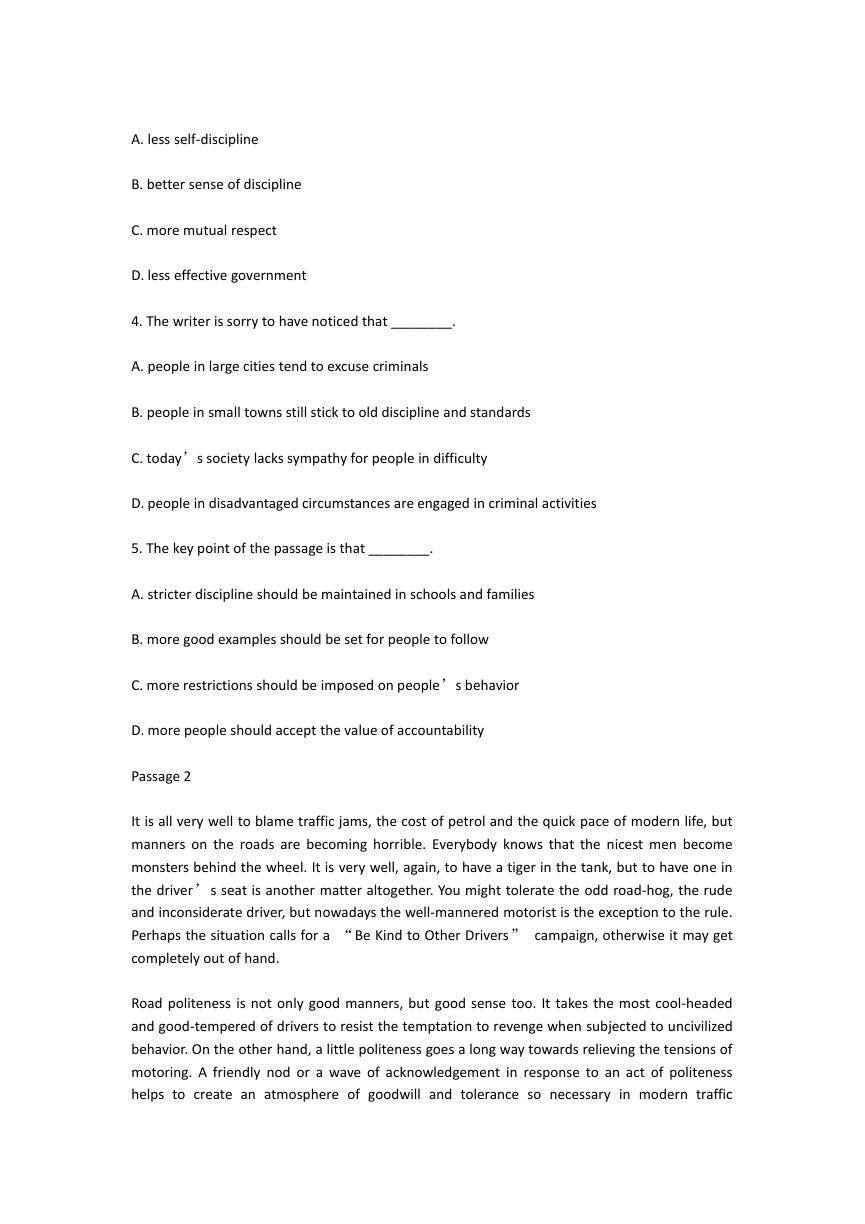2019 年广东暨南大学英语水平考研真题
Part I. Vocabulary and Structure (30 points)
Directions: There are 30 incomplete sentences in this section. For each sentence there are 4
choices marked A, B, C and D. Choose the one that best completes the sentence and write your
answer on the ANSWER SHEET.
1. The district _______ was established by the government a few years ago.
A. council B. counsel C. console D. consul
2. Heavy rainfall in the south of England means that flooding is____.
A. imminent B. momentous C. transient D. prospective
3. Early studies often concluded that the public was ________ the propagandistic influence of
mass communications, but one recent
that, on the contrary, mass
communications seldom produce marked changes in social attitudes or actions.
study indicates
A. unaware of B. scornful of C. susceptible to D. coping with
4. This composer has never courted popularity: her rugged modernism seems to defy rather
than to ________ the audience.
A. ignore B. discount C. teach D. woo
5. ___________, we have to adopt new measures to solve the problem.
A. So is the situation B. That being the case
C. That is the case D. The situation is so
6. The school agree to ___ their decision until they had spoken to the young boy’s parents.
A. convert B. retain C. deter D. expel
7. When a psychologist does a general experiment on the human mind he selects
people________ and asks them questions.
A. at length B. at random C. in essence D. in bulk
8. She is careful with her money, and spends only a ______ of her earnings.
�
A. fragment B. section C. fragrant D. fraction
9. Proposed changes that are not _________ with exiting safety regulations will not be
considered.
A. dependent B. compliant C. relating D. supportive
10. Please note that customs regulations do not permit the shipment of ______ items.
A. perishable B. compatible C. sustainable D. incredible
11. Reporters and photographers alike took great _________at the rude way the actor behaved
during the interview.
A. annoyance B. offence C. resentment D. irritation
12. Advances in food preservation gave consumers in developed countries access to_______all
foods grown in distant lands.
A. extensively B. virtually C. artificially D. continually
13. The music aroused an________feeling of homesickness in him.
A. intrinsic B. intentional C. intermittent D. intense
14. An institution that properly carries the name university is a more comprehensive and
complex institution than any other kind of higher education__________.
A. settlement B. establishment C. construction D. structure
15. “If we fail to act now,” said Tom, “We’ll find ourselves __________in action later on.”
A. paid back B. paid for C. paid up D. paid off
16. If you want children to work hard you must ________their interests instead of their sense of
duty.
A. appeal to B. look into C. give rise to D. go in for
17. I really appreciate _______ to help me, but I am sure that I will be able to manage by myself.
A. that you offer B. you to offer
�
C. your offering D. that you are offering
18. Heredity accounts for 50% to 60% of a woman’s ________ to alcoholism, about the same as
for men.
A. devastation B. vulnerability C. pharmacy D. fibrosis
19. Although the false banknotes fooled many people, they didn ’ t __________ to close
examination.
A. keep up B. put up C. stand up D. pay up
20. The ink had faded with time and so parts of the letter were _________.
A. illiterate B. illegible C. illegitimate D. illegal
21. Policeman _______ very busy.
A. nearly are always B. always are nearly
C. always nearly are D. are nearly always
22. The media once portrayed the governor as anything but ineffective; they now, however,
make her out to be the epitome of __________.
A. fecklessness B. brilliance C. dynamism D. egoism
23. The girl was sorry to __________ the singers when she arrived at the airport.
A. be missed B. being missed
C. have been missed D. have missed
24. The greatest obstacle to economic and environmental
countries is their __________ foreign debts.
improvements in the developing
A. reminiscent B. degenerative C. mammoth D. ethical
25. Materials presenting permanent deformations after the disappearance of the loads are said
______ plastically.
A. to have behaved B. behaving C. to behave D. behavior
26. The best way to control rats is by seeing that they have as _________.
�
A. possibly little nourishment B. nourishment possible little
C. little as possible nourishment D. little nourishment as possible
27. Oceans play a major role in climate, often serving to ________ extremes of hot or cold.
A. exacerbate B. temper C. conceal D. obscure
28. _________ is intrinsic to language, but writers should nevertheless strive to be as precise as
possible.
A. Equivocation B. Ambiguity C. Malapropism D. Innuendo
29. The fact that irony is __________ means that the listener (or reader) who “gets it” is able
to feel superior to those who do not understand it.
A. subtle B. humorous C. situational D. generic
30. All the flights ________because of the snowstorm, we had to take the train instead.
A. were canceled B. had been canceled
C. having canceled D. having been canceled
Part II. Proof-reading and Error Correction(10 points)
Directions:
Proofread the given passage as instructed. The passage contains TEN errors. Each indicated line
contains a maximum ONE error. In each case, only ONE word is involved. You should proofread
the passage and correct it in the following way:
For a wrong word Underline the wrong and write the correct one in the blank provided on the
answer sheet.
For a missing word Mark the position of the missing word with a “∧” sign and write the word
you believe to be missing in the blank provided on the answer sheet.
For an unnecessary word Cross the unnecessary word with a slash “/” and put the word in the
blank provided on the answer sheet.
What is the advantage which we may hope to derive a study of the political writers of the past?
An earlier view would have provided a simple answer to this question. A work of politics, it
�
would have been said, is the handbook of an art, the art of governing. Just as a man of superior
skill in the art of carpentry may compile a work in which his skill is made available to those who
inspire to be good carpenters, so a man of inferior wisdom in the art of politics may set down his
knowledge in a book for the construction of those whose business it is to find, govern, or
preserve states. If this is what political theory is, there is no difficulty in determining what
advantage may be expected from the study of great political works. They will be insulted by
those who have to govern states. But this is certainly not the advantage which a modern reader
can be compromised from a study of their works. This entire conception of politics as an art and
of the political philosopher as the teacher of it rests upon assumptions which it is possible to
accept. If it were correct, the writers of political theory would need to be themselves past
masters in the art of governing, and statesmen would need to apprentice themselves to them in
order to learn their job. But we find that this is not so. Few political philosophers have
themselves exhibited any master of the art of governing, and few successful statesmen have
owed up their success to the study of political writings.
1. ____________
2. ____________
3. ____________
4. ____________
5. ____________
6. ____________
7. ____________
8. ____________
9. ____________
10. ____________
Part III. Cloze (20 points)
Directions: There are 20 blanks in the following passage. You are required to read the passage
and fill in each bank with a word from the word bank, and change the form where necessary. Do
not use any of the words in the bank more than once. Write your answers on the ANSWER
SHEET.
combing intricate heyday churning utilitarian pillars tiers descending paving relaxation irrigation
architecturally dotted craters level positioned inhabitants access aquifer passages
�
During the sixth and seventh centuries, the 1 of the modern-day states of Gujarat and Rajasthan
in North-western India developed a method of gaining 2 to clean, fresh groundwater during the
dry season for drinking, bathing, watering animals and 3 . However, the significance of this
invention – the stepwell — goes beyond its 4 application. Unique to this region, stepwells
are often 5 complex and vary widely in size and shape. During their 6 , they were places of
gathering, of leisure and 7 and of worship for villagers of all but the lowest classes. Most
stepwells are found 8 round the desert areas of Gujarat (where they are called vav) and
Rajasthan (where they are called baori), while a few also survive in Delhi. Some were located in
or near villages as public spaces for the community; others were 9 beside roads as resting places
for travellers.
As their name suggests, stepwells comprise a series of stone steps 10 from ground level to the
water source, (normally are underground 11 ) as it recedes following the rains. When the water
12 was high, the user needed only to descend a few steps to reach it; when it was low, several
levels would have to be negotiated. Some wells are vast, open 13 with hundreds of steps 14 each
sloping side, often in 15 . Others are more elaborate, with long stepped 16 leading to the water
via several storeys. Built from stone and supported by 17 , they also included pavilions that
sheltered visitors from the relentless heat. But perhaps the most impressive features are the 18
decorative sculptures that embellish many stepwells, showing activities from fighting and
dancing to everyday acts such as women 19 their hair or 20 butter.
Part IV. Reading Comprehension (30 points)
Directions:
In this section, there are three passages followed by questions or unfinished
statements, each with four suggested answers marked A, B, C, and D. Choose the best answer
and write the letter of your choice on the ANSWER SHEET.
Passage 1
A wise man once said that the only thing necessary for the triumph of evil is for good men to do
nothing. So, as a police officer, I have some urgent things to say to good people.
Day after day my men and I struggle to hold back a tidal wave of crime. Something has gone
terribly wrong with our once-proud American way of life. It has happened in the area of values.
A key ingredient is disappearing, and I think I know what it is: accountability. Accountability isn’t
hard to define. It means that every person is responsible for his or her actions and liable for their
consequences. Of the many values that hold civilization together — honesty, kindness, and so
on — accountability may be the most important of all. Without it, there can be no respect, no
trust, no law — and, ultimately, no society.
My job as a police officer is to impose accountability on people who refuse, or have never
learned, to impose it on themselves. But as every policeman knows, external controls on
people ’ s behavior are far less effective than internal restraints such as guilt, shame and
�
embarrassment.
Fortunately there are still communities — smaller towns, usually — where schools maintain
discipline and where parents hold up standards that proclaim: “In this family certain things are
not tolerated — they simply are not done!”
Yet more and more, especially in our larger cities and suburbs, these inner restraints are
loosening. Your typical robber has none. He considers your property his property; he takes what
he wants, including your life if you enrage him.
The main cause of this breakdown is a radical shift in attitudes. Thirty years ago, if a crime was
committed, society was considered the victim. Now, in a shocking reversal, it’s the criminal who
is considered victimized: by his underprivileged upbringing, by the school that didn’t teach him
to read, by the church that failed to reach him with moral guidance, by the parents who didn’t
provide a stable home.
I don’t believe it. Many others in equally disadvantaged circumstances choose not to engage in
criminal activities. If we free the criminal, even partly, from accountability, we become a society
of endless excuses where no one accepts responsibility for anything.
We in America desperately need more people who believe that the person who commits a crime
is the one responsible for it.
1. What the wise man said suggests that ________.
A. it’s unnecessary for good people to do anything in face of evil
B. it’s certain that evil will prevail if good men do nothing about it
C. it’s only natural for virtue to defeat evil
D. it’s desirable for good men to keep away from evil
2. According to the author, if a person is found guilty of a crime, ________.
A. society is to be held responsible
B. modern civilization is responsible for it
C. the criminal himself should bear the blame
D. the standards of living should be improved
3. Compared with those in small towns, people in large cities have ________.
�
A. less self-discipline
B. better sense of discipline
C. more mutual respect
D. less effective government
4. The writer is sorry to have noticed that ________.
A. people in large cities tend to excuse criminals
B. people in small towns still stick to old discipline and standards
C. today’s society lacks sympathy for people in difficulty
D. people in disadvantaged circumstances are engaged in criminal activities
5. The key point of the passage is that ________.
A. stricter discipline should be maintained in schools and families
B. more good examples should be set for people to follow
C. more restrictions should be imposed on people’s behavior
D. more people should accept the value of accountability
Passage 2
It is all very well to blame traffic jams, the cost of petrol and the quick pace of modern life, but
manners on the roads are becoming horrible. Everybody knows that the nicest men become
monsters behind the wheel. It is very well, again, to have a tiger in the tank, but to have one in
the driver’s seat is another matter altogether. You might tolerate the odd road-hog, the rude
and inconsiderate driver, but nowadays the well-mannered motorist is the exception to the rule.
Perhaps the situation calls for a “Be Kind to Other Drivers” campaign, otherwise it may get
completely out of hand.
Road politeness is not only good manners, but good sense too. It takes the most cool-headed
and good-tempered of drivers to resist the temptation to revenge when subjected to uncivilized
behavior. On the other hand, a little politeness goes a long way towards relieving the tensions of
motoring. A friendly nod or a wave of acknowledgement in response to an act of politeness
helps to create an atmosphere of goodwill and tolerance so necessary in modern traffic
�
















 2023年江西萍乡中考道德与法治真题及答案.doc
2023年江西萍乡中考道德与法治真题及答案.doc 2012年重庆南川中考生物真题及答案.doc
2012年重庆南川中考生物真题及答案.doc 2013年江西师范大学地理学综合及文艺理论基础考研真题.doc
2013年江西师范大学地理学综合及文艺理论基础考研真题.doc 2020年四川甘孜小升初语文真题及答案I卷.doc
2020年四川甘孜小升初语文真题及答案I卷.doc 2020年注册岩土工程师专业基础考试真题及答案.doc
2020年注册岩土工程师专业基础考试真题及答案.doc 2023-2024学年福建省厦门市九年级上学期数学月考试题及答案.doc
2023-2024学年福建省厦门市九年级上学期数学月考试题及答案.doc 2021-2022学年辽宁省沈阳市大东区九年级上学期语文期末试题及答案.doc
2021-2022学年辽宁省沈阳市大东区九年级上学期语文期末试题及答案.doc 2022-2023学年北京东城区初三第一学期物理期末试卷及答案.doc
2022-2023学年北京东城区初三第一学期物理期末试卷及答案.doc 2018上半年江西教师资格初中地理学科知识与教学能力真题及答案.doc
2018上半年江西教师资格初中地理学科知识与教学能力真题及答案.doc 2012年河北国家公务员申论考试真题及答案-省级.doc
2012年河北国家公务员申论考试真题及答案-省级.doc 2020-2021学年江苏省扬州市江都区邵樊片九年级上学期数学第一次质量检测试题及答案.doc
2020-2021学年江苏省扬州市江都区邵樊片九年级上学期数学第一次质量检测试题及答案.doc 2022下半年黑龙江教师资格证中学综合素质真题及答案.doc
2022下半年黑龙江教师资格证中学综合素质真题及答案.doc